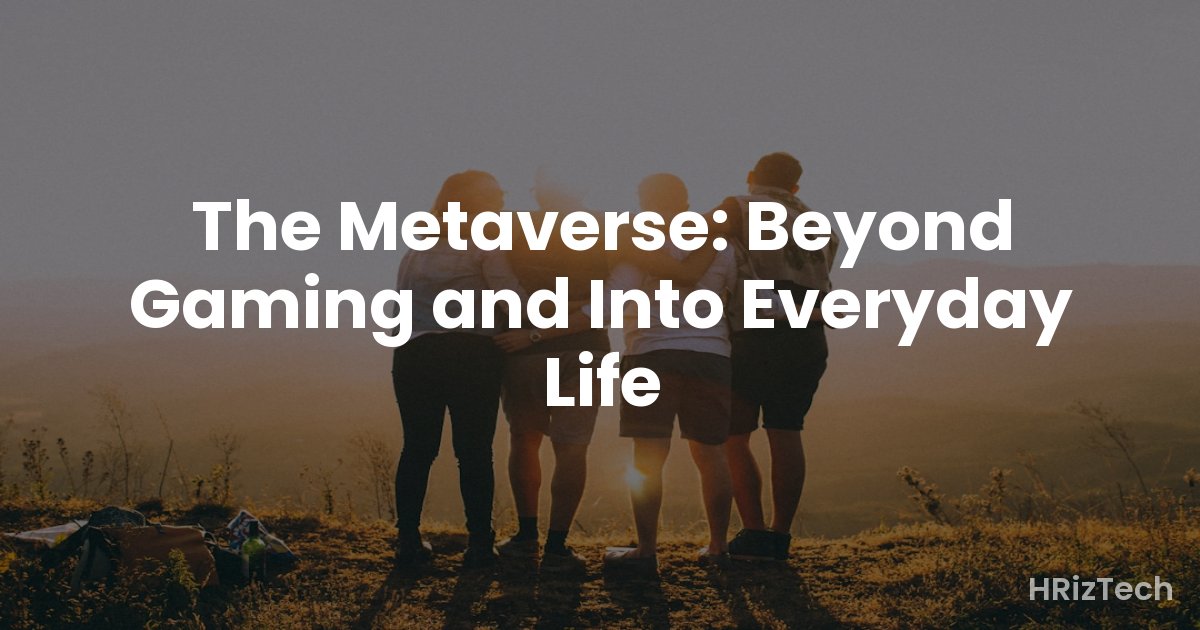The Metaverse: Beyond Gaming and Into Everyday Life

The Metaverse: Beyond Gaming and Into Everyday Life
- The metaverse is evolving beyond gaming, impacting various aspects of our daily lives.
- Businesses are leveraging the metaverse for innovative marketing and sales strategies.
- Virtual and augmented reality technologies are key drivers of metaverse development.
- Concerns about data privacy, accessibility, and ethical implications need addressing.
- The future of the metaverse holds immense potential but also presents challenges.
From Pixels to Possibilities: The Metaverse Beyond Gaming
For many, the metaverse conjures images of avatars battling in virtual worlds or attending concerts in digital stadiums. While gaming remains a significant driving force behind metaverse development, its potential extends far beyond the realm of entertainment. We're witnessing a rapid expansion of metaverse applications impacting education, healthcare, retail, and even remote work, transforming how we interact, learn, and conduct business.
Revolutionizing Retail: Shopping in the Metaverse
Imagine trying on clothes virtually before purchasing them, or exploring a virtual store from the comfort of your home. This isn't science fiction; it's the reality of metaverse retail. Brands are increasingly creating immersive shopping experiences, offering customers a unique and engaging way to interact with products. This shift allows for personalized experiences, reducing returns and enhancing customer satisfaction. The ability to test products virtually, explore detailed 3D models, and even interact with virtual sales assistants is drastically changing how we shop.
Virtual Showrooms and Immersive Experiences
Luxury brands are leading the charge, creating high-fidelity virtual showrooms where potential buyers can explore collections and interact with virtual representatives. This approach not only expands market reach but also builds brand loyalty by providing exclusive and personalized experiences. The tactile nature of virtual interaction, even if not perfectly replicating physical touch, greatly enhances the shopping experience, especially for high-value items.
Transforming Education: Immersive Learning in the Metaverse
The metaverse offers unparalleled opportunities for education. Imagine students dissecting a virtual frog in biology class without the need for a physical specimen, or exploring the Roman Empire through a fully immersive virtual tour. This interactive approach to learning caters to diverse learning styles, making education more accessible and engaging. Virtual field trips, interactive simulations, and collaborative learning environments are just a few examples of how the metaverse is revolutionizing education.
Virtual Classrooms and Collaborative Learning
The ability to create virtual classrooms that transcend geographical limitations is a game-changer. Students from across the globe can collaborate on projects, participate in discussions, and learn from each other in real-time. This fosters a sense of community and enhances the learning experience, particularly for students who might struggle in traditional classroom settings.
Healthcare Innovations: The Metaverse in Medicine
The metaverse's applications in healthcare are rapidly expanding. Surgeons can practice complex procedures in virtual environments, reducing risks during actual surgeries. Medical students can gain hands-on experience without the need for real patients, and patients can receive remote consultations and therapy sessions in immersive virtual environments. The potential to improve medical training, patient care, and research is immense.
Virtual Consultations and Therapy
Telemedicine is evolving with the metaverse, allowing for more engaging and empathetic interactions between patients and healthcare providers. Virtual reality therapy is proving effective in treating various conditions, including phobias and anxiety disorders, by creating safe and controlled environments for exposure therapy.
The Challenges and Concerns: Navigating the Metaverse
Despite the immense potential, the metaverse also presents significant challenges. Data privacy and security are major concerns, as user data collected in virtual environments is particularly vulnerable. Accessibility remains a barrier for many, requiring affordable and accessible hardware and internet connectivity. Ethical considerations, such as the potential for addiction and the spread of misinformation, require careful consideration.
Addressing the Ethical and Accessibility Gaps
Developers and policymakers must work together to ensure the metaverse is developed responsibly. This includes establishing clear guidelines on data privacy, accessibility, and ethical conduct. Promoting digital literacy and addressing the digital divide are crucial for ensuring equitable access to the benefits of the metaverse.
The Future of the Metaverse: A Collaborative Endeavor
The metaverse is still in its nascent stages, but its potential to transform our lives is undeniable. Collaboration between developers, policymakers, and users is crucial for shaping a metaverse that is inclusive, ethical, and beneficial to society. The future of the metaverse is not predetermined; it is being built, brick by virtual brick, through collective effort and thoughtful consideration.
Key Takeaways
- The metaverse is expanding beyond gaming, impacting various sectors.
- Businesses are using it for innovative marketing and sales.
- VR/AR technology drives metaverse development.
- Data privacy, accessibility, and ethics are key concerns.
- The future holds immense potential but also challenges.
So, what are your thoughts on the future of the metaverse? What industries do you think will be most significantly impacted by this transformative technology?
Comments
No comments yet. Be the first to comment!